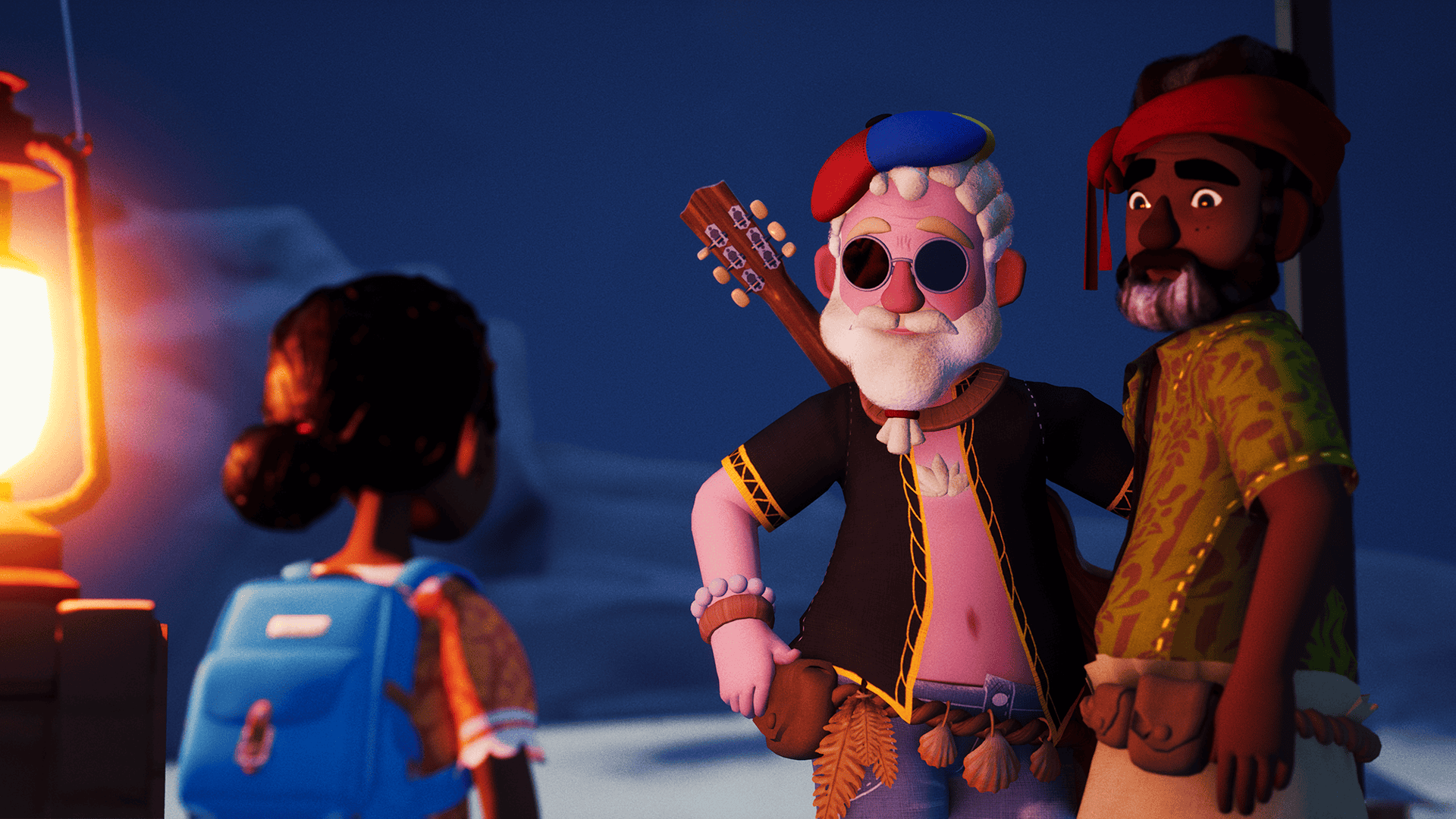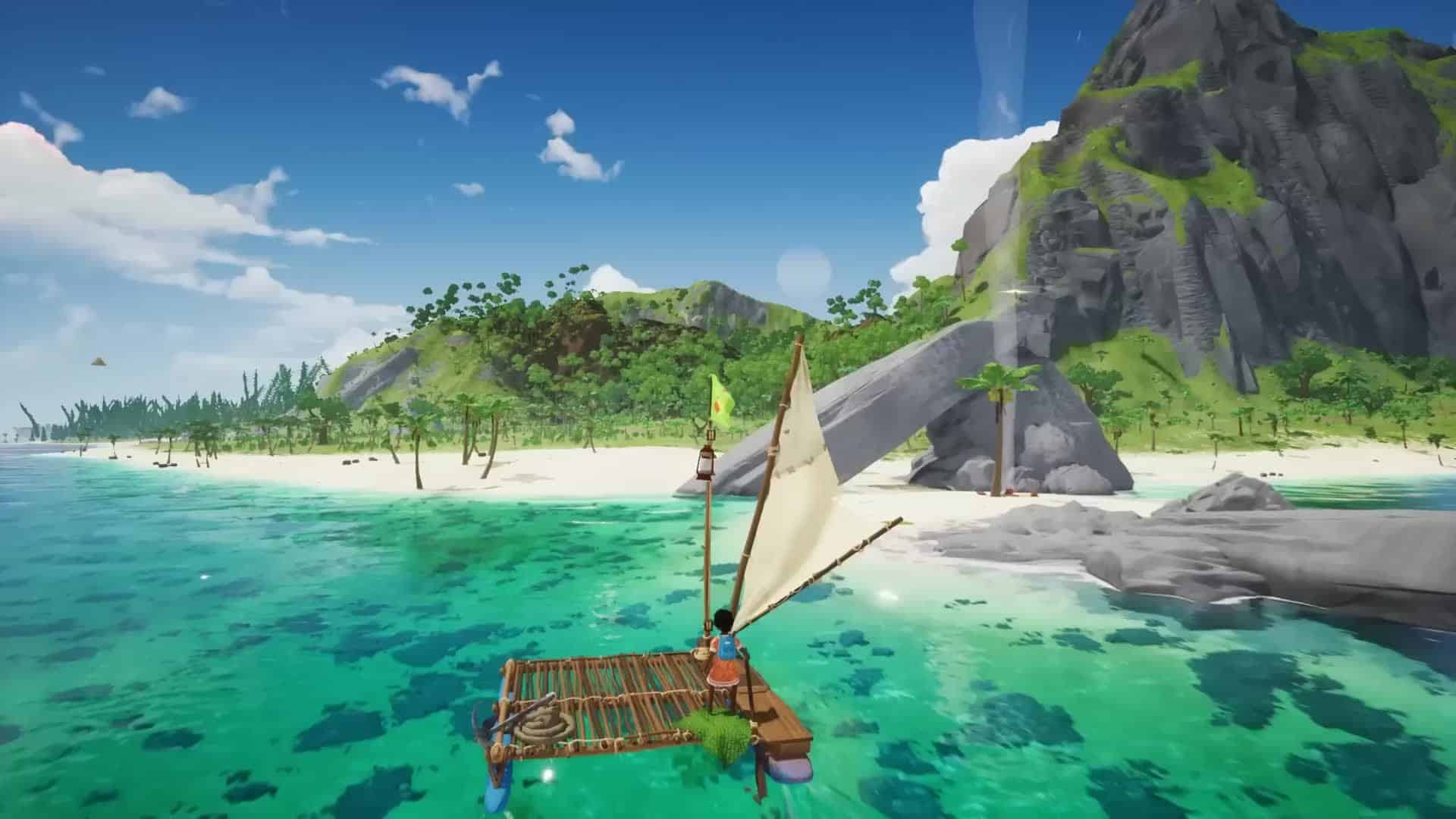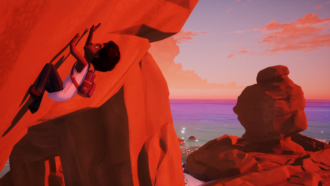Platforms:
PS4, PC, PS5
Released:
March 21, 2023
Publishers:
Awaceb, Kepler Interactive
Developer:
Awaceb
Tchia is an adventure game on a fictional island group inspired by the authentic New Caledonian islands. Nature and exploration are at its core, sending you on an emotional and gorgeous sea-faring adventure to bring the fight to the powers that be. That magic and spirit mostly remain throughout the game, providing a fun open-world sandbox to get lost in. Thankfully, that heart manages to stay away from the rough edges that can be visible from time to time, making this a charming title worth exploring.
Fighting authorities and taking care of your kindred
Tchia has players controlling a protagonist of the same name. Her biggest call to action comes when her peaceful life on the islands is cruelly interrupted when the archipelago’s evil ruler, Meavora, has her father kidnapped. Strange creatures known as the Maano have sprouted up, made of fabric and possessed by some form of evil spirit. The Maano and Meavora pose a great threat, colonising and polluting the gorgeous and captivating islands you call home. It’s up to you to set sail around the archipelago, liberate the lands, rescue your father and defeat the evil forces.
Tchia shows great strength in this premise and the vibes that accompany your journey. Across your open-world exploration, you’ll well and truly feel at home and at one with nature. Dozens of flora and fauna populate the islands, all available for you to get up close and personal with as you begin to get a lay of the land. In fact in your initial starting area, not much has been disturbed. You’re venturing out close by, gathering food and materials for Tchia and her father, only to return to your hut at night. Here, you’ll share folklore stories via song over a campfire, with Tchia’s father singing in Dehru (a native New Caledonian language that everyone in-game speaks) while she plucks along with a ukulele and other instruments.
This love and adoration of language, family and the land are found wherever you go in Tchia. It’s an entirely heartwarming and constant theme, even in the face of darkness. You’ll meet plenty of new friends and companions on your journeys far and wide. You’ll see the start of cities, factories, gentrification and capitalism begin as you go further out to the surrounding islands, a cruel reminder of the sad inevitability of colonialism. Within all of that though, the friends you make are key in helping you on your journey, including teaching Tchia new abilities or stories so she soon has a further understanding of her own culture.

Tchia has an excellent first three quarters where it cruises quite smoothly, serving more as a piece about the environment and vibes rather than any seminal narrative beats. It’s in the last quarter that it will undoubtedly lose some players due to its quick acceleration used to bring the narrative to a close. You needn’t fret, it sticks the landing in a heartfelt way but before you get there you’re having very abrupt twists and turns, and the very late introduction of very important characters. Tchia is a short game that only takes about 10 hours to roll credits in and that’s a problem when a decent chunk of that feels like its moving at the speed of sound.
At the end of the day, I still walk away from Tchia and its story positively. There are moments in there that I genuinely teared up at. Some I laughed at and felt my heart swell as I grew more and more in love with its world. However, that whiplash remains. This feels like a game that was intended to in fact be longer (indicative that after the credits roll there’s an endgame where you’re working on toppling another key figure), only to be somewhat scrapped and attempted to be made into a tighter experience, where some of that mess still remains.
Becoming one with nature
The biggest notch in Tchia’s favour is the suite of traversal and movement options available to the player. Before long, Tchia gathers the ability to ‘Soul Jump,’ allowing her to take the form of any animal (and most objects) in sight. This means instead of just walking and climbing or even sailing on your raft, you can take to the skies as one of the many species of bird, or explore the ocean depths as a fish, shark, turtle, dolphin and the like. Thankfully, developer Awaceb proves themselves more than capable of capturing all of these different movement types, with each feeling fluid and natural.
Not only is this means of moving about paired oh so well with the narrative and themes of being intimate with nature, but it fosters good experimentation and improvisation. Work and juice the limited amount of time an object or animal can be possessed in your favour, and you’re accomplishing some wonderful feats. Maybe you start out on flatter land and want to cover some distance. Jumping into a deer with a faster sprint can help in this regard. Otherwise, a bird can get you the height you need to clear a hill or mountain more efficiently.
Gameplay moments are often the highlight in Tchia. One instance I was leaving a building’s rooftop to make for some nearby hills, where a landmark awaited just over the other side. So I took to a bird to get height and distance. Satisfied with the distance I cleared, I jumped back into my normal form and whipped out Tchia’s paraglider to get that extra bit further. As the use of this is determined by her stamina at the time, I soon erupted from this gliding, plummeting. It’s only in thinking on the fly that I was able to quickly and safely jump into a rock on the cliffside, hence comfortably rolling down the hill and not costing my life.
You’d be forgiven if you watched a trailer or two of Tchia and equated it to a type of experience you’d find in a Zelda game. Namely, two of its closest comparisons would be The Breath of the Wild for its open-ended exploring and climbing and The Wind Waker for its sea-faring adventure. The “you see it you can climb it,” design philosophy that comes with the former of the two is very apparent in Tchia. Harsh cliffsides, buildings, trees and the like can all be scaled while you nervously keep an eye on your stamina meter, second-guessing if you’ll ever really make it. When you’re on your raft you’re seeing the breeze brush by Tchia. It’s entirely invigorating as you’re seeing crisp ocean blues and rocky waves the further out you go.
The traversal options feel near endless at times and none is weaker than the other. The only time this lets up is the rare occasion of jumping into an inanimate object, which controls a little more unwieldy in the way that hiding in an object in an online game of Prop Hunt would. At the peak of tree tops, you can even bend and manipulate the tree so that it swings back and forth, building momentum for Tchia to careen off of, taking her into the sky. I was so pleased and mesmerised by the way the game handles and Tchia can move about. I imagine that excitement will grow tenfold when the public gets their hands on it and also find their own creative ways to navigate the islands. Truth be told, I had a wonderful time exploring Tchia.
Planting an endearing coat of paint on the open-world formula
Nothing Tchia does is particularly new to the open-world formula of games, but it’s what it does with that template that is everlastingly endearing. While your map will be populated by many landmarks and waypoints to go visit, none ever indicate exactly Tchia’s whereabouts. It’s only by going to a literal signpost in the world and interacting with it that you’re given a rough estimate of where Tchia is by means of circling a spot on the map. This encourages players to become more familiar with their surroundings and is quite an engaging asymmetrical way of giving the player information. Maybe you see a dock a hundred meters or so down a hill from you. You know you checked into a signpost just a moment ago behind you, meaning when you cross-reference with the map this dock can only be this one out of all spread across the world. This is once again another wonderful marriage of narrative, themes and gameplay, noting players must become at one with nature.
There is the type of activities and landmarks you’d expect. Certain points on your map are high-in-the-air Ubisoft-esque landmarks, revealing more points of interest once you interact with them. How Tchia does so is by an oh-so-endearing bird call as the camera pans around the area. Camps are home to the Maano and must be cleared out via combat. Weak only to fire, you must possess or throw flammable or explosive items at them, destroying each enemy individually as well as their nests. Clearing these (along with many other different types of activities) reward players with more cosmetics for Tchia, useful in changing her appearance, hence becoming intrinsic in the coming-of-age story being told in the background.

“Nothing Tchia does is particularly new to the open-world formula of games, but it’s what it does with that template that is everlastingly endearing.“
Further encouraging and fostering exploration are the discoverable stamina and soul fruits peppered throughout the world, making Tchia’s stamina and soul jump meter higher and therefore easier to climb bigger and bigger heights. Tucked away are cute and endearing little treasure hunts, time trail races against a clock to familiarise yourself with how an animal moves, and even a shooting range to test out your accuracy with Tchia’s slingshot.
Never are you in pursuit of growing numbers or collecting perks in this game. You needn’t worry about gear. All that is upgraded is your stamina and soul-jumping ability, making gameplay even more fun the more hours you put in. Sure, there are dozens upon dozens of things on a checklist to tick off but when a game is this smooth to play and low pressure with how much you want out of its world… it’s a breath of fresh air.
I could go on and on about the minigames found in-game. Yes, some are weaker than others (I’m looking at you, the unwieldy rock-stacking minigame) but at the end of the day, it’s plenty of welcome distractions and side affairs to get lost in. Tchia’s world is gorgeous, as is exploring it. I wish more open-world games these days were like it.
It’s worth noting that (at least on PC) I did experience a small handful of bugs I’m hoping are ironed out by release. These came to me more in the late game, where awkward platforming instances had me falling through the world. Here I had to either start or handily pick the ‘skip gameplay section’ option found in the settings in the menu, bringing me instead to the next narrative cutscene. If these are so worked out then it’s all for the better. Tchia will move from the good game it is to the great game it deserves to be.
7
Good
Positive:
- Soul jumping and traversal options feel endless and are oh so satisfying
- Story, setting and themes are full of heart
- Vibrant and colourful world feels engaging and fun to explore
- An open-world game not bogged down by numbers or gear
- Minigames are welcome distractions
Negative:
- Last quarter of story is rushed
- Not without a few bugs on PC
- Occasional unwieldy nature of some combat and possessing of objects
Tchia provides a vibrant and enjoyable world to explore. Soul jumping into an animal or object to move about is an incredible mechanic that allows for creativity, experimentation, and improvisation. Sailing among the waves is mesmerising in colour and imagery, as is the thick jungle and wildlife that also awaits. What’s more refreshing is the open-world formula the game offers that doesn’t daunt you, only rewarding you for however much you choose to engage with it. Tchia may have the occasional bug on PC and a rocky and overly accelerated last quarter of a story, but remaining throughout is a narrative and world with heart, love, and a feeling of home. For that alone, this is a game well worth taking to the high seas for.











